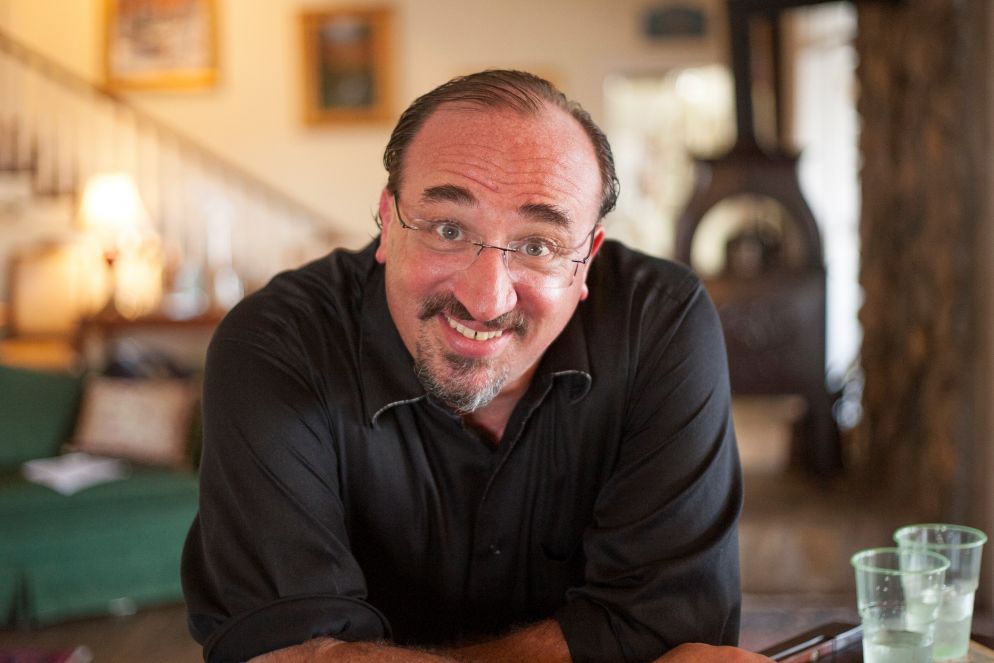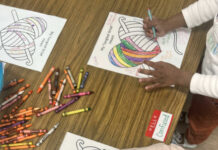Daniel Weiser has an impressive background — a doctorate in piano and chamber music from the Peabody Conservatory, an undergraduate degree in American history from Columbia University in New York and a one-year stint in law at Harvard Law School. He did well in law school, Weiser shared, but his love of music steered him away from that subject and into his life-long passion.

Weiser is the founder of AmiciMusic — music among friends — an organization based in North Carolina and Baltimore, and which, according to its website, “is dedicated to performing the highest quality chamber music in intimate venues and non-traditional spaces.” Most of the chamber music concerts are held in an intimate atmosphere in Weiser’s north Baltimore City home, as well as in more public spaces.
The 55-year-old Guilford resident has lived in Baltimore for 10 years with his physician wife, Dr. Kirsten Weiser, and twin teenage daughters, Rose and Sophie. The native of Buffalo, N.Y., lived in Asheville, N.C., for four years before moving to Charm City. Prior to that, he taught music at Dartmouth College in Hanover, N.H., where he started his first music series that continues today, called Classicopia. In Baltimore, Weiser also holds regular concerts at Baltimore Hebrew Congregation. An article in the Baltimore Jewish Times on April 25, 2019, covered the launch of the monthly concerts, made possible by a grant from the Peggy and Yale Gordon Trust.
The goal of AmiciMusic, Weiser remarked in a recent phone interview, is to make classical music accessible to everyone. Concerts, he notes, are traditionally held on a large stage with a significant space between the artist and audience in a formal and often solemn setting that can be intimidating to potential new attendees.
The “About” section on AmiciMusic’s website makes this clear: “We are committed to breaking down barriers between performers and audiences by setting up a more relaxed and informal atmosphere at concerts and through informative talks about each composer’s life before each piece is played.”
Additionally, Weiser strives to ensure that the repertoire of AmiciMusic’s concerts spans the cultural spectrum, featuring diverse composers from a variety of backgrounds that broaden the scope of classical music to include aspects of jazz, tango and other more traditionally “folk” idioms.
“I make sure that I include diverse composers in an effort to both educate and entertain,” Weiser explained. “In January, we did both a program of trios with folk influences from around the world (Gypsy, Spanish and Czech) and featured an all-Russian composer concert to prepare us for winter; in May, we will feature women composers. I have also done several programs of music from Latin America with a wonderful cellist who comes from Ecuador and was born in Brazil. I love to share the history of the composers with the audience, and in so doing, bring their art to light and expand the classical repertoire to more diverse audiences.”
For Black History Month this year, Weiser organized a series of weekend concerts titled “Black Brilliance: A Celebration of Black Composers.” The concerts included music for violin, cello and piano by Scott Joplin, dubbed “The King of Ragtime;” Undine Smith Moore; Samuel Coleridge-Taylor; Florence Price; and William Grant Still.
For the upcoming weekend of March 3 through March 5, AmiciMusic will offer “Totally Tango,” described as “fantastic tangos for cello and piano” by French-born Argentine singer Carlos Gardel. It will include Brazilian composer Ernesto Júlio de Nazareth and Argentine composer Astor Piazzolla.
Credit to his parents, his ‘biggest supporters’
During the worst of COVID-19 restrictions, Weiser found a way to continue to offer programming via Zoom. “We figured out the technology,” he said, “and we were able to do high-quality online classes in North Carolina and in Baltimore.”
Top-notch musicians who collaborate with Weiser also offered concerts via Zoom that were taped and later uploaded to YouTube. Weiser also taught classes divided into three or four parts covering a range of composers. He is planning to continue to offer these classes, which are open to the public for a fee, in the spring.
Weiser spoke passionately about the opportunities he has had in sharing his love of music. He also spoke wistfully about the two people who made it all possible: his mother, Helen Weiser, who passed away in August 2022; and his father, Dr. Milton Weiser, who was chief of gastroenterology at Buffalo General Medical Center and who died in 2017.
“I don’t think I would have ever become a musician if she hadn’t encouraged me all the rest of the way,” Weiser said. “My mother was the only Jewish mother I know who was really happy that her son dropped out of Harvard Law School. She made sure I stayed in the right course,” as he pursued a degree in chamber music.
Weiser’s mother, a nurse, and later in life, a museum docent, was also an artist in her own right, leaving behind a treasure trove of poetry. In fact, both parents wrote a children’s book that, while not published, their son plans to make available on a website dedicated in their memory.
“My mother,” said Weiser, “was my biggest supporter. She wrote a poem titled ‘Forte Piano,’ which she wrote about me when I was 8 after my piano teacher at New England Prep had told her how musically I played a piece by Edward McDowell called ‘To a Wild Rose.’ She actually framed that New Yorker cartoon she mentions in the poem, and I found it in her house after she passed.”
The cartoon Weiser shared features a man walking away from the piano, while a woman stands in a celebratory pose — she appears to leap in the air, with a huge smile and arms outstretched to the heavens above — with the caption: “Accepting the applause for Mr. Fontana … Mr. Fontana’s mother.”
“Music is about building community,” Weiser said. “We bring fantastic musicians who love to sit and talk with the audience, something I prefer, as it helps to break down barriers. You have to break down the barriers to classical music and not make it elitist. Classical music is not going to die; we just have to reinvent ourselves and make the music accessible, and franchise this whole idea.”
For more information on upcoming concerts and classes, see: www.amicimusic.org.






